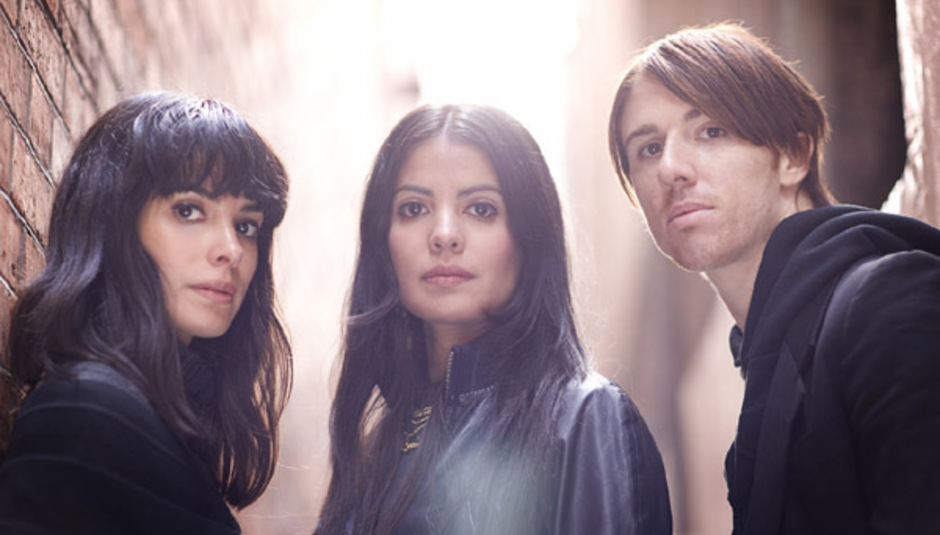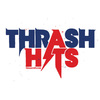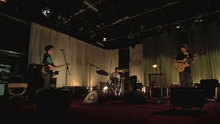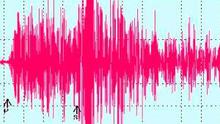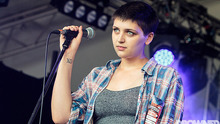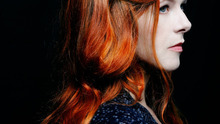DiS loves School Of Seven Bells. Their debut LP Alpinisms hasn't been far from our stereo these past few months (we got a US import, it's only just dropped over here), its ethereal, textured majesty a true warmer on those dark winter nights. We inducted them into our Class Of 2009 at the turn of the year.
The New York band, who comprise Benjamin Curtis (you may remember him from Secret Machines, more on whom later) and sisters Alejandra and Claudia Deheza, have just completed a UK headline tour but return in April for dates with Bat For Lashes and a few shows of their own (including one for DiS, again more later).
Here, we speak to Curtis about the recording of Alpinisms, laying the ghost of his old band to rest and also about his obsession with the Slowcore movement...
Hello Benjamin, where abouts are you right now?
Benjamin Curtis: We may or may not be in Belgium right now, but we're on our way to Amsterdam.
Well, that should be fun. Amsterdam's a cool place. Some questions, then: I've read that many of the lyrics are directly influenced by Alejandra's dreams, which seems kind of fitting given the dreamy nature of the music... 'dream-pop' is a phrase that crops up often in reviews. Is it one you agree with?
BC: Yeah, I like that. Even given the sugary association 'dream-pop' has. I really like the idea of dreams, the subconscious and this abstraction of everything... and I like pop... so therefore I like dream-pop. Anything anyone wants to say about us is fine, and that sounds good to me.
That's something the three of you have in common, right? Isn't that why you started the band in the first place, because you found you were on a similar wavelength?
BC: Definitely, we have so much in common, similar ideas, and just our attitudes to things - we really gelled. We can speak very vaguely about musical ideas, but we make sense to each other - so it works really well.
I understand that the lyrics come first in the writing process, which is quite a non-standard way of working...
BC: That's right, we do it top-to-bottom, mainly because we just wanted to try it that way and it really worked. Doing it the more standard way, when you get to the point you're working on a melody and have words, you're really restricted to only a few choices. We had this idea of letting the words, melodies and harmonies go free, just completely unrestricted. Having the music fit around that was kind of an interesting idea for us, because in a sense it makes the music choices much more limited. It forces us to write in a way we're not used to.
You're treating the voices as entirely separate instruments in their own right...
BC: Yeah, completely, and what happens is that they end up being this really stable centre of the world, the atmosphere of the song. The music's just an ornament to that, it tells the story a little bit more rather than being this 'thing' on its own. If you listen to our music instrumentally it's really strange, there's not a lot happening and it's all these little parts that just fit around all the vocal things that are happening. It's when I listen to what we've done afterwards, instrumentally, that I think 'Wow, I never would have done that, or made music that sounds like this'. It's cool.
Video: School Of Seven Bells 'Half Asleep'
---
You've got your own home studio where the early material was written - is that where the album was recorded too?
BC: Yeah, the recording and mixing was all done in our studio. I engineered it. We'd done a few small single releases that way, but it was the first time [we'd done an album] and I was really learning as I went how to work everything. It was a really, really sharp learning curve to get it to the level of how we wanted it to sound. A lot of hours!
How did that compare to working in a more traditional studio environment?
BC: In one sense it's good when you're on the clock, it forces you to go, there's this pressure to do it. But at the same time it's really restricting - inspiration can come at any time. And being able to live with something, being able to write and then record... putting it on our iPods and walking down to East River or something... that's a total luxury. It's like we're existing in the city and doing what we do, but the recording and writing becomes a part of that. It's a really organic way of working, but you have to know when to stop, y'know? That's the hardest thing to do, to call something done.
I guess you never really clock off...
BC: We were actually really good. We never used to work until 10am, we'd stop in the afternoon, and we'd never work past 8pm. We weren't keeping crazy hours doing it, so it was like the best of both worlds.
How long did the album take to make? The first single, 'My Cabal', was released over here almost two years ago now, yet the LP's only just had a full UK release...
BC: It was actually a demo... the first thing we'd ever recorded. We weren't even really a band yet! It was just an idea, and it came out. Nat Cramp who has the Sonic Cathedral label and club night, I gave it to him, he loved it and wanted to put it out. He ended up ripping it off of the CD-R I gave him! It was super-informal. I think a few months after that we actually played live for the first time and then we played only a few more times that year. We were recording off-and-on the whole time, trying things out, and come Spring 2008 we had a lot of stuff done, but it wasn't right for an album. So we basically just trashed it. We were at the point then when we were really sharp, we knew what we wanted to do and how to work our gear, so we then made the album really fast, in, like, three or four weeks, recording everything again and then mixing it.
So that time was basically sorting out the sound and working out what you wanted to do?
BC: Yeah, there was a lot of time learning what it was we wanted to do, a lot of trial and error. We got to this point where we knew what we had to do, and knew that we had to finish it. We had a lot of energy for it by then, and just went for it. I think doing it like that was really important because it gave it the cohesion that an album needs. And I'm really happy with the result.
Video: School Of Seven Bells 'My Cabal'
---
Given the layered nature of the material, has it been at all difficult to recreate the texture of the sound in a live setting?
BC: It was weird, we started out by filling it out with other musicians live, but we reached this point when we realised that the electronic elements were there for a reason, we wanted it to sound electronic. But figuring out how to do that was tricky. And there was just something about the chemistry the three of us had onstage, and the way the three of us play together, that's really crucial to what we do sounding like School Of Seven Bells. I've never really been in a band with sequenced drums before, so once we'd kind of made peace with that and decided to go with it, it sounded really great and we've been really happy with it since. It's a lot less restricting than I thought it'd be.
How many people are there in the live band now, then?
BC: It's just the three of us. Me, and Ally and Claudia. Ally and I play guitar, Claudia synths. We haven't used other musicians for maybe a year now.
I read somewhere that you received hate mail from Secret Machines fans when you left that band - has the backlash subsided a bit now?
BC: It's so funny... I mean, I don't really blame them. People seemed to really identify with that band, and because I worked so hard on it... y'know, I started that band, and people felt betrayed. There was this incredibly loyal faction of people that were upset. But, now, it's weird because most of the people who are into School Of Seven Bells have no idea what we've done before, it's a totally new thing to them. All the time people come up to me and say, 'Wow, I love [School Of Seven Bells]. What do Secret Machines sound like?'. That's really cool, that we're able to be appreciated on our terms now.
I remember reading a lot of pieces that made a big deal of the 'ex-Secret Machines' tag at first...
BC: That's fine, I mean it's a fact. I was worried at first that we'd be seen as this rebound band, or a side-project, because that's so dismissive. We're obviously not that, and it's not even a factor any more so I don't worry about it.
Have you heard the latest Secret Machines record?
BC: I haven't! I heard it before it was mastered when Brandon [Curtis, Benjamin's brother and Secret Machines frontman] played it for me, but I haven't heard it since. It's not because I don't want to, it's just because I haven't got around to it...
Video: Prefuse 73 w/ School Of Seven Bells 'The Class Of 73 Bells'
---
I understand you're a pretty big fan of the Slowcore genre. We ran a week of content on it recently, and your PR told me you wanted to write something for us but didn't quite get round to it...
Yeah, yeah. It's cool, I saw it. But I'm really bad when I sit down in front of a screen and I have to type up some kind of explanation; my mind goes completely blank so I just couldn't do it via email. I've been telling this story a lot recently, but only because I've begun to realise how much of a formative experience it was for me... it was my first concert ever, in Dallas, Texas. It was Fugazi, at a place called The Bomb Factory. The band right before them was Bedhead, who were also from Dallas, Texas... this seminal Slowcore band. I was this really small kid, hanging out with these total punks and they just so livid about [Bedhead]. They were playing this really, really slow beautiful song that had this epic ending, it was a song off their second record called 'The Rest Of The Day'. The bass player was playing a glockenspiel... it was so slow, and there were, like, three guitar players and two of them were just playing this one note over and over. And it was making this entire audience livid, they were so angry: 'This is NOT punk-rock!'. And it made me really happy, because I realised that being really slow and really beautiful and really calm was just as subversive as being angry and angular. I was so happy that something so beautiful could piss off a room full of people. Ever since, that record, Beheaded, has been in my top five, and looking back now I realise that was a turning point for me, it made me want to make music that was beautiful and huge-sounding.
Who are some of your other favourite bands in that genre?
Unrest, did you ever hear them? And Low, of course... Bedhead... I'd say those three are my favourite.
Finally, you're playing a DrownedinSound show for us in Sheffield on May 13th - it's going to be your first in the city. What should we expect?
Well, people should expect a fucking tight show because we're going to have been on tour for, like, five months at that point! So it's going to be really good. I've only played in Sheffield one time, and that was with Secret Machines. We blew out the stage power and only got to play half of one song, and then we just left. So I'm excited to play a full set!
Alpinisms is out now on Full Time Hobby. Read DiS' 8/10 review here. More information on the aforementioned DiScover show with Telepathe in May can be found on Last.fm and Facebook.

